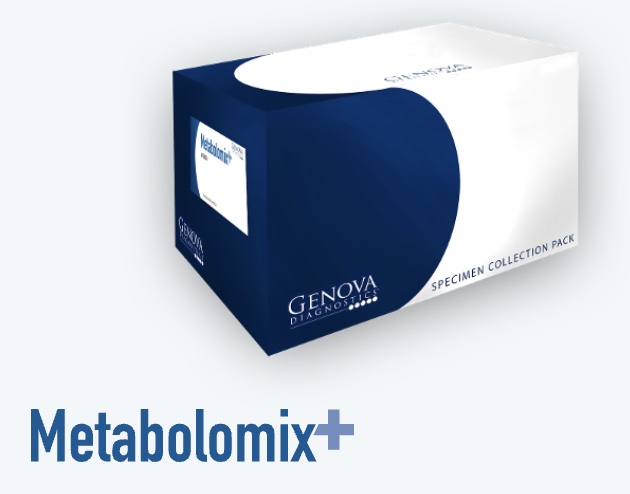Testing – In-home Nutrition Test
$499.99
A Non-Invasive Personalized Nutritional Assessment
Description
Metabolomix+: A Non-Invasive Personalized Nutritional Assessment
The Metabolomix+ is a unique combination of nutritional tests that provides an analysis of key nutritional biomarkers. A first morning void (FMV) urine collection, with optional add-on bloodspot finger stick and buccal swab, the Metabolomix+ nutritional test is a non-invasive, patient-friendly way to assess the functional need for antioxidants, B-vitamins, minerals, digestive support, fatty acids, and amino acids. Insights gained from the Metabolomix+ nutritional test allows clinicians to target nutritional therapies to meet the precise needs of their patients.
Which patients might benefit from functional nutritional testing?
Common clinical indications for testing include:
Several diseases are associated with abnormal organic acid, amino acid, and fatty acid levels such as depression, anxiety, cardiovascular disease, neurocognitive decline, diabetes, cancer, anorexia, and many others.7,8,9,10
*Testing is not performed in patients under 2 years old.
About the Metabolomix+ Profile
The Metabolomix+ Profile report categorizes results into several metabolic areas (see sample report for individual analytes):
- Personalized Results Overview and Nutrient Need Overview
- Functional Imbalance Scores in areas of methtional educational support for you and your patient highlighting the function of each nutrient, cause of deficiency, complications of deficiency and food sources of the nutrient
- Organic Acids (urine)
- Malabsorption and Bacterial/ Yeast Dysbiosis Markers are metabolites produced by the gastrointestinal microbiome
- Cellular Energy & Mitochondrial Metabolites are biomarkers of carbohydrate and fatty acid metabolism, and the citric acid (Kreb’s) cycle
- Neurotransmitter Metabolites are downstream byproducts of epinephrine, norepinephrine, serotonin and dopamine
- Vitamin Markers are specific analytes used to assess functional levels of vitamin cofactors
- Toxin & Detoxification Markers relate to certain toxic metabolites and the body’s detoxification capacity
- Oxalate Markers relate to kidney stone formation, oxidative stress and metabolic dysfunction
- Amino Acids (urine)
- Essential Amino Acids must be derived from dietary sources
- Nonessential Amino Acids are synthesized by the body
- Intermediary Metabolites are byproducts of amino acid metabolism
- B Vitamin Markers are involved in biochemical reactions that specifically require B vitamins
- Urea Cycle Markers are byproducts associated with nitrogen (ammonia) detoxification
- Glycine/Serine Metabolites are involved in the serine-to-choline pathway and the methylation pathways
- Dietary Peptide Related Markers can indicate incomplete protein breakdown and meat intake
- Oxidative Stress Markers (urine) include the oxidative damage markers lipid peroxides and 8-OHdG
+ COMPONENTS
- Add-on Essential and Metabolic Fatty Acids Markers (Bloodspot- whole blood)
- Omega 3 Fatty Acids are essential for brain function and cardiovascular health and are anti-inflammatory
- Omega 6 Fatty Acids are involved in the balance of inflammation
- Omega 9 Fatty Acids are important for brain growth, nerve cell myelin, and reducing inflammation
- Saturated Fatty Acids are involved in liproprotein metabolism and adipose tissue inflammation
- Monounsaturated Fats include omega 7 fats and unhealthy trans fats
- Delta-6 Desaturase Activity assesses efficiency of this enzyme to metabolize omega 6’s and omega 3’s
- Cardiovascular Risk includes specific ratios and the Omega 3 Index
- Add-on Comprehensive Urine Element Profile (urine) assesses 20 toxic and 15 mineral elements
- Add-on SNPs (buccal swab) include MTHFR, COMT, TNF-a, and APOE
What is a functional nutritional assessment?
Genova’s unique approach to nutritional testing begins by assessing our body’s biochemical pathways. Marked accumulation of organic acids in urine can signal a metabolic inhibition or block. The metabolic block may be due to a nutrient deficiency, an inherited enzyme deficit, toxic build-up, or drug effect.
Enzymes that are responsible for metabolizing organic acids are vitamin and mineral dependent. With this, elevations in organic acids can reflect a functional need for these nutrients on a cellular and biochemical level, even despite normal serum levels. Recommendations for nutrient supplementation based on elevated organic acid results are generated using a literature-based proprietary algorithm.
Traditionally, urinary organic acid assessment has been used in neonatal/pediatric medicine to identify genetic inborn errors of metabolism, with severity depending on the degree and type of error.* In many cases of genetic inborn errors, the enzymatic defect may be compensated for by high doses of specific vitamin and mineral cofactors and/or dietary interventions. Intervention with higher-dose nutrient cofactors may also be effective in cases of decreased enzyme activity due to causes other than frank inborn errors.
* Genova’s organic acid testing is not intended for the diagnosis of neonatal inborn errors of metabolism.
Only logged in customers who have purchased this product may leave a review.





Reviews
There are no reviews yet.